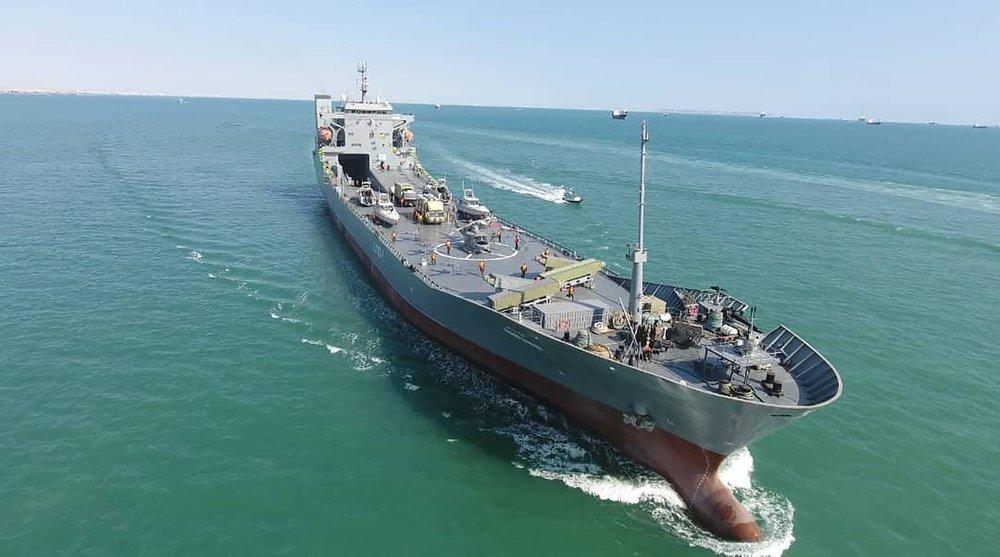


The Indian Navy ships of the First Training Squadron have arrived in the port city of Bandar Abbas, Iran for a joint training deployment in the Persian Gulf. This visit marks an important step in strengthening maritime cooperation between India and Iran. During the visit, the ships will participate in various activities to enhance maritime security and interoperability between the two navies. This visit highlights India's commitment to promoting regional cooperation in line with the vision of SAGAR.
India and Iran Strengthen Maritime Cooperation with Joint Training Deployment
The Indian Navy's First Training Squadron has embarked on a historic visit to Bandar Abbas, Iran, for a joint training deployment in the Persian Gulf. This collaboration marks a significant advancement in maritime cooperation between the two nations.
Background:
India and Iran share a long history of cultural, economic, and strategic ties. In recent years, there has been a growing emphasis on enhancing maritime cooperation to address common security challenges in the Indian Ocean Region (IOR).
Joint Training Deployment:
The First Training Squadron, comprising Indian Navy ships INS Tir (A86) and INS Shardul, arrived in Bandar Abbas on February 26, 2023. During their stay, the Indian and Iranian navies will conduct joint exercises, including anti-submarine warfare drills, communication drills, and ship handling exercises.
This training deployment aims to improve maritime security and interoperability between the two navies, enhancing their ability to jointly respond to threats in the Persian Gulf and IOR.
Significance:
The joint training deployment highlights India's active engagement in promoting regional cooperation in line with the SAGAR (Security and Growth for All in the Region) initiative. It underscores India's commitment to maintaining a secure and stable maritime environment in the IOR, which is vital for global trade and energy security.
FAQs:
1. What is the purpose of the joint training deployment? To enhance maritime security and interoperability between the Indian and Iranian navies.
2. How long will the training deployment last? The duration of the training deployment has not been disclosed publicly.
3. What ships are involved in the deployment? INS Tir (A86) and INS Shardul from the Indian Navy.
4. Has India had joint training deployments with Iran before? Yes, there have been previous joint exercises between the Indian and Iranian navies in the past.
5. What are the strategic implications of India's growing maritime cooperation with Iran? It strengthens regional cooperation, enhances India's influence in the Persian Gulf, and promotes maritime security in the IOR.

As Liverpool struggled to find their form in a tough game against Manchester United, Dutch midfielder Cody Gakpo stood out with his sharp attack and strong composure. Despite hitting the woodwork three times, Gakpo managed to score a brilliant equalizer for his team, showcasing his potential and talent on the field. While Liverpool may have lost the match, Gakpo's impressive performance provided a glimmer of hope for a struggling team.

Ayodhya's Deepotsav 2025 was a shining example of faith, community, and innovation as the city set two new world records with over 26 lakh diyas and a grand aarti performed by 2,100 priests. The event, witnessed by Chief Minister Yogi Adityanath, also showcased a spectacular 3D projection mapping and drone light show that brought Lord Ram's story to life in the night sky. The event was a testament to the deep connection Ayodhya's youth have with Lord Ram's ideals and was made possible by the hard work of over 40 potter families and thousands of volunteers.

In a brazen and perfectly orchestrated robbery, a group of thieves infiltrated the world-famous Louvre Museum in Paris on Sunday morning and made off with a collection of priceless jewels with an estimated value in the millions. French officials confirmed the robbery and began a detailed investigation to determine how the culprits managed to evade the museum's advanced security systems and execute the crime in under seven minutes. This latest incident has raised serious concerns about the protection of national treasures at one of the world's most popular tourist destinations.

In an audacious heist, a group of armed thieves breached security at the iconic Louvre Museum in Paris and stole nine valuable jewels from the collection of Napoleon Bonaparte and Empress Joséphine. The robbery, which took place in just seven minutes, has prompted a full-scale police investigation and raised concerns about the museum's security. French officials are working to recover the stolen items, but the Louvre remains closed to visitors.

Despite a ceasefire in early October, the conflict between Israel and Palestine shows no signs of abating, with reports of ongoing deadly clashes and Israeli tank fire targeting a car in Gaza City. The closure of the Rafah border crossing to Egypt, citing Hamas's failure to retrieve bodies, has further exacerbated tensions. However, experts warn of the uncertain future for a transitional government in Gaza and the risk of breaching the fragile ceasefire. The violence and closure highlight the ongoing humanitarian crisis and the need for both sides to engage in peaceful negotiations.

Hundreds of travellers heading to India from Italy for Diwali were left stranded after Air India cancelled its Milan-Delhi flight due to a technical issue. The sudden breakdown of the flight raised concerns about making it home in time for the festival. Some passengers even face the prospect of celebrating Diwali away from home due to rebookings on alternate flights. Air India assured that they are prioritising passenger safety and comfort while providing necessary support to those affected.

On day 1,312 of Russia's war on Ukraine, tensions continue to escalate as Ukrainian drones target a Russian oil pumping station, Russian forces seize three more villages in eastern Ukraine, and NATO increases its presence in the Baltic Sea region. In response to the ongoing conflict, the Ukrainian security service reports that the SBU caused a fire and halted operations in the Chuvashia region, while Russia's military announced its continued advance in Donetsk and Dnipro. Meanwhile, NATO's decision to deploy additional military assets comes after several days of unidentified drone sightings in Denmark and at military bases.

The upcoming India-Australia ODI series has drawn attention for multiple reasons, including the successful return of Rohit Sharma and Virat Kohli as white-ball players. Despite being relieved of captaincy, the duo is expected to continue playing in the format until the 2027 World Cup, according to Australia's Travis Head and India's Axar Patel. As both teams gear up for a high-stakes clash, the focus remains on the future of these two icons and their potential to lead India to another ODI World Cup victory.

Pakistani security forces have thwarted a suicide attack targeting their camp in Mir Ali, North Waziristan, after a vehicle loaded with explosives was driven into the perimeter wall. In a separate operation, 34 militants described as "India-backed terrorists" were killed in multiple engagements across Khyber Pakhtunkhwa. These operations form part of Pakistan's continued efforts to eliminate foreign-sponsored terrorism from the country under the vision "Azm-e-Istehkam."

Amid an intensified wave of militant activity in Pakistan's northwestern tribal belt bordering Afghanistan, security forces successfully foiled a major suicide attack on a military camp in North Waziristan's Mir Ali area. Four terrorists, including a suicide bomber, were killed in the exchange, with no casualties among security personnel. The incident highlights the ongoing threat of militant activity in the region, with recent counterterrorism operations resulting in the death of 88 militants, including several from the Tehreek-e-Taliban Pakistan (TTP).